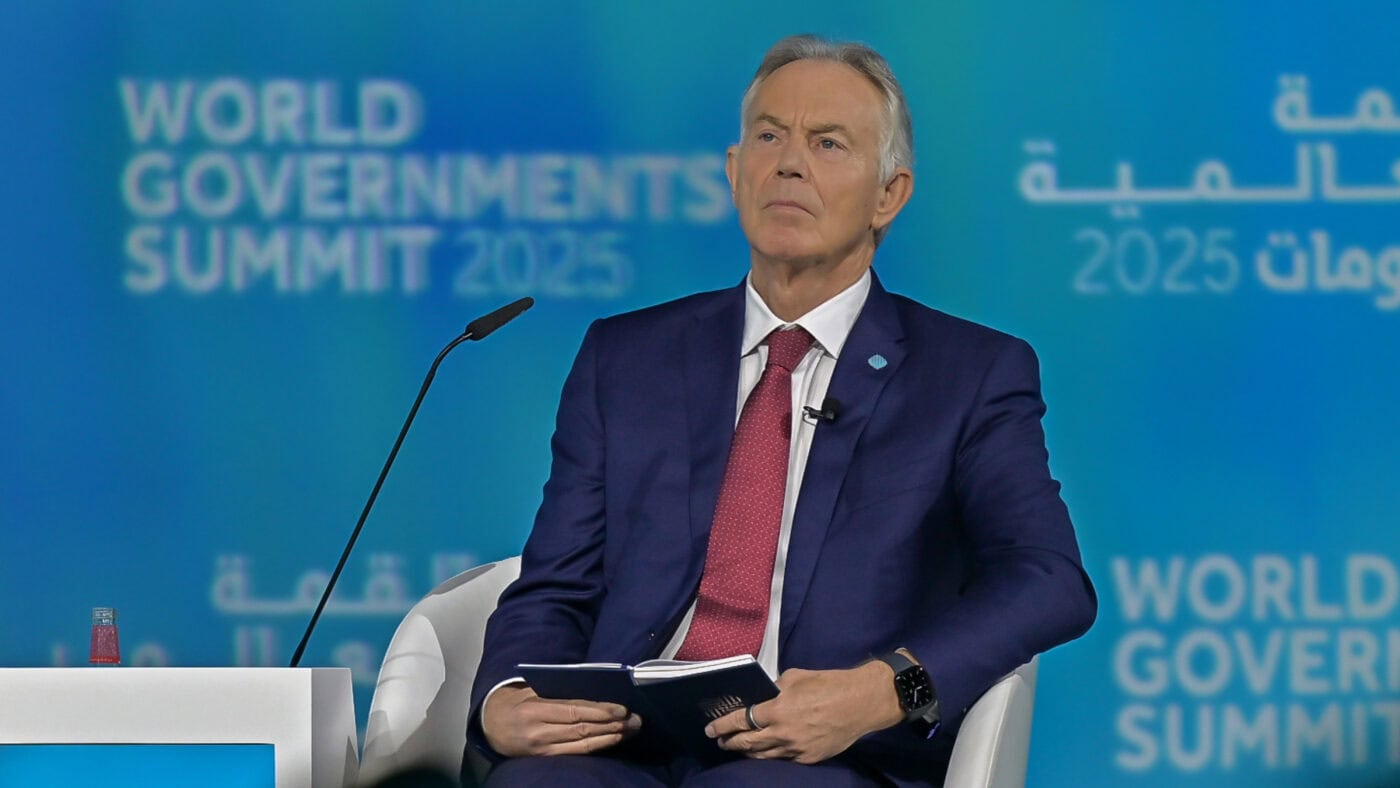Tony Blair always was an audacious character. Eric Anderson, his headmaster at Fettes, recalled a regular knock on his door. “Round it would come that grinning Blair face, which said, ‘Sir, I don’t think this rule or that rule is right, can we change it?'” When he was Labour leader, he went a long way towards ditching socialism – not as far as some of us would like, of course. There was even the symbolic ditching of Clause 4 of the Party’s Constitution – as if the Archbishop of Canterbury decided the ten commandments were in need of ‘modernisation’.
If Blair had any ‘philosophy’, it was about being new, energetic, embracing change and being young. That was always pretty vacuous stuff. As he will be celebrating his 72nd birthday next week, it seems even more silly.
Yet he retains the capacity to shake things up. The Times reports this morning:
Sir Tony Blair has warned there needs to be a radical reset of ‘irrational’ net-zero policies because they are ‘doomed to fail’. The former prime minister said that voters were being asked to make ‘financial sacrifices and changes in lifestyle’ that would have ‘minimal’ effect on global emissions.
He went on to say:
Political leaders by and large know that the debate has become irrational. But they’re terrified of saying so, for fear of being accused of being ‘climate deniers’.
The comments come in a foreword to a paper that has been produced for his institute, which warns that ‘net-zero policies, once seen as the pathway to economic transformation, are increasingly viewed as unaffordable, ineffective, or politically toxic’.
It calls for ‘pragmatism’ to replace ‘alarmism’. For technological solutions to reducing emissions to be pursued, rather than hair-shirt miserablism.
The timing has been remarked upon. Labour sources regard it as ‘really unhelpful’ coming a day before the local elections. Blair’s note of scepticism chimes with Kemi Badenoch and Nigel Farage. I can imagine Blair’s old spin doctor Alastair Campbell ringing Blair up in a great rage and swearing at him – quite like old times. But Blair has never been as partisan as Campbell. Blair’s relationship with the Labour Party was more transactional – it was a mechanism for him to achieve his ambitions, while for the Party, he was an election winner.
Furthermore, Blair can hardly be expected to have any personal loyalty to Ed Miliband, the Energy and Net Zero Secretary. When Miliband was Labour leader, he went out of his way to trash Blair’s legacy.
To my mind, what was ‘really unhelpful’ about Blair’s timing was that he didn’t make the comments a couple of decades ago. The label of ‘climate denier’ goes back to when he was Prime Minister. With its deliberate echo of ‘holocaust denier’, it was highly effective in silencing critics of the consensus on climate change.
The Climate Change Act 2008 was passed a year after he left Downing Street and set the trend towards targets that combined being ruinously expensive and environmentally irrelevant. When he first became Prime Minister in 1997, the UK took part in the Kyoto Climate Change Summit, agreeing to various damaging targets – the United States declined to sign up to the protocol. Estimates of the cost of the UK reaching the futile Net Zero target vary widely – but come not just to billions or hundreds of billions but trillions.
Craig Mackinlay wrote this in 2021, about just one part of the bill:
An independent report by the social housing sector magazine, Inside Housing, put the cost of decarbonising the UK’s social housing sector alone at £103 billion, or approximately £20,000 per household. If such costs are replicated across the entire housing stock, we are looking north of £500 billion just for residential decarbonisation.
Martin Durkin has produced an excellent documentary, ‘Climate: The Movie’, debunking the consensus. Rigorous in the data it cites, the film concludes that the planet is not coming to an end but is doing just fine. That global warming is real, but the extent of it has been exaggerated and it has advantages as well as disadvantages. Any apocalyptic rhetoric is absurd. Eminent scientists are interviewed, setting out the sceptical case most emphatically – Nobel laureates among them. But they speak from the safety of retirement. The science was never really ‘settled’. Dissenters were cast out or silenced. Thus, the ‘consensus’ was something of a self-fulfilling prophecy.
Will the Net Zero spell now be broken? Blair’s intervention will have an impact, even though he has now softened his stance. So will the blackout in Spain this week – which many suspect might have something to do with overdependence on unreliable energy sources such as wind and solar. It also disrupted supply in Portugal and France. How long before the lights are going out all over Europe?
One does not want to be too churlish. Blair did not have to speak out in the way he has. There is nothing he likes better than schmoozing at Davos and other such venues for international networking. Perhaps he will have a more awkward reception in future.
Blair remarks that ‘too often, political leaders fear saying what many know to be true: the current approach isn’t working’. Did he only just discover that? One suspects not. If only he could have overcome his own fears a bit earlier.
Click here to subscribe to our daily briefing – the best pieces from CapX and across the web.
CapX depends on the generosity of its readers. If you value what we do, please consider making a donation.


